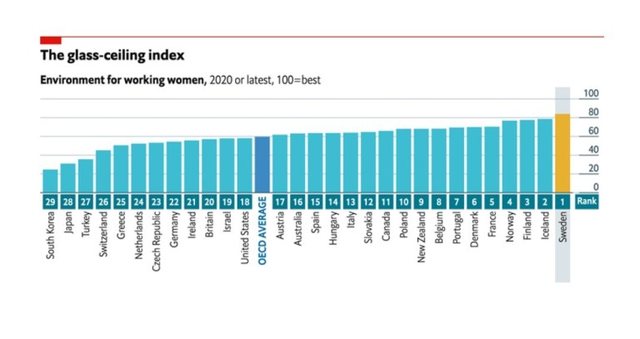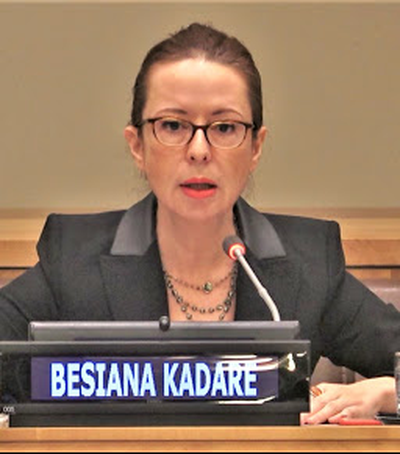
On the occasion of International Women’s Day, The Economist Glass Ceiling Index (GCI) ( https://www.economist.com/IWDay ) shows that women are still at a disadvantage compared to their male counterparts in leadership positions, averaging only one third in leading positions in the OECD.
The GCI is an annual assessment of where women have the best and worst opportunities for equal treatment puts the workplace in the Organization for Economic Co-operation and Development (OECD) countries.
GCI, which combines data on higher education, labor force participation, wages, childcare costs, maternity and paternity rights, business school applications, and representation in high-level jobs to create rankings in the 29 OECD countries, shows that Sweden is the best place to work for women, followed by Nordic neighbors - Iceland, Finland and Norway. The Nordic countries are particularly capable of helping women complete university, secure a job and reach high-level positions, and enjoy quality parental leave systems and flexible working hours.
South Korea ranks at the bottom of the index for the ninth consecutive year, with Japan and Turkey not far behind. Social norms in Asia still expect women to choose between having a family or a career.

According to the analysis that accompanies this year the GCI index https://www.economist.com/GCeilingIndex. Progress has been made in America, where 41% of executives are women and 28% of board members are women, above the OECD average. This is partly evidenced by the women who have taken on CEO roles in various US companies in the past year, including Citigroup, UPS, Walgreens and TIAA.
Significant findings of The Economist Glass-Ceiling Index 2021
The United States has climbed four positions in the index compared to last year. While the percentage of women in leadership roles and boards is higher than average, it remains below the OECD average, without parental leave with a federal mandate.
The UK has improved by three points in this year’s index; the quota of women in senior-level positions is about one-third.
Germany has dropped to 22nd place in the standings compared to last year. German women occupy only 29% of leadership roles and only a quarter of positions on management boards.
France ranks fifth in the GCI, the same as last year. France ranks second with the highest percentage of women on governing boards, after Iceland.
This is the ninth year of publication by The Economist of the Glass-Ceiling Index. When first published in 2013, the index analyzed only 5 indicators in 26 countries. Today the index analyzes 10 indicators, including maternity leave for 29 OECD countries
The best and worst OECD countries for working women.

1. Sweden
2. Iceland
3. Finland
4. Norway
5. France
6. Denmark
7. Portugal
8. Belgium
9. New Zealand
10. Poland
11. Canada
12. Slovakia
13. Italy
14. Hungari
15. Spain
16. Australia
17. Austria
OECD AVERAGE
18. United States
19. Israel
20. Great Britain
21. Ireland
22. Germany
23. Czech Republic
24. The Netherlands
25. Greece
26. Switzerland
27. Turkey
28. Japan
29. South Korea
Source: Monitor





